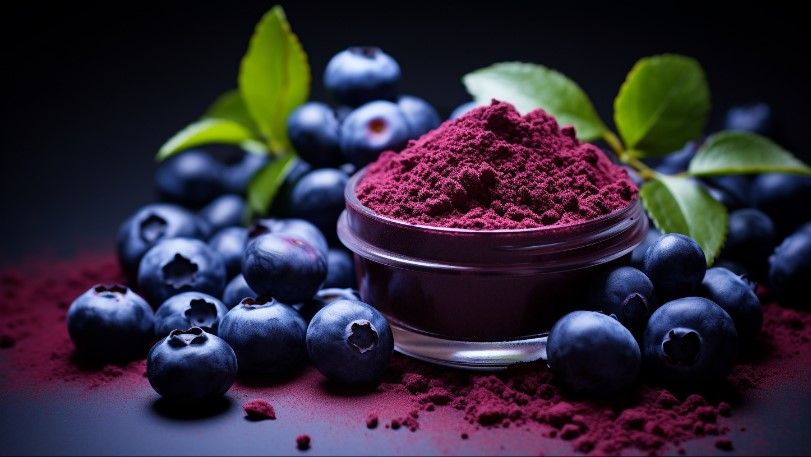Natural eye care nutrients

Blueberry anthocyanins
Blueberry belongs to the rhododendron family and the huckleberry family. Native to North America, a perennial shrub with small berries, called blueberries because of the blue color of the fruit
The nutritional value of blueberries
Why is blueberry known as the “king of berries”, because compared with other fruits, it is not only nutritious, but also contains a lot of anthocyanins, containing 167mg of anthocyanins per 100 grams, and Nordic wild blueberries are even better, its anthocyanin content is 15 times that of cultivated blueberries!
Antioxidant star – anthocyanins
It is a kind of water-soluble natural pigment widely existing in plants in nature, and widely exists in the cell fluid of flowers, fruits, stems, leaves and other tissues. It is an important antioxidant active ingredient in food.
• Antioxidant
Anthocyanins have strong antioxidant properties, which can improve the body’s immunity, delay aging, alleviate visual impairment and degeneration, reduce the aging speed of skin and body organs, and have significant effects on vascular sclerosis, heart disease and memory enhancement.
• Improved vision
Clinical studies have shown that anthocyanins in blueberries can promote the regeneration of retinal cells, which can prevent severe myopia and retinal detachment, and improve vision.
• Beauty
Anthocyanins can whiten the skin and lighten the skin effect, because it can remove free radicals in the body, thereby reducing the production of melanin in the body, can effectively prevent the appearance of color spots, freckles, age spots and wrinkles, long-term consumption can also play a role in anti-aging, so you can eat a proper amount of anthocyanin-rich food every day.
• Anti-aging
Anthocyanins have strong oxidants, the antioxidant capacity of this substance is particularly good, can eliminate free radicals in the body, make the skin more smooth, often add anthocyanins, can also prevent skin wrinkles or stains.
• Protect joints
Anthocyanins can improve joint flexibility and prevent joint fluid accumulation. The elderly can supplement some anthocyanins, usually can eat more fruits with high anthocyanin content, such as blueberries and grapes.
• Cardiovascular health
Anthocyanins can delay the aging of blood vessel cells, maintain the elasticity of blood vessels, prevent hardening, and reduce blood pressure. Moreover, it has antioxidant properties, which can protect good cholesterol in the blood vessels, reduce the content of bad cholesterol in the blood vessels, remove small thrombosis, restore the basic elasticity of the blood vessels, so as to prevent the emergence of atherosclerosis.
• Inhibits inflammation
Anthocyanins can play a bactericidal and anti-inflammatory effect, so people infected with inflammatory diseases, appropriate supplementation of some anthocyanins, you can enhance the body’s immunity, control the development of inflammation.
• Prevention of chronic metabolic diseases
Anthocyanins can increase the high density lipoprotein in the blood and reduce the low density lipoprotein, which has an obvious effect on the prevention of cardiovascular and cerebrovascular diseases.
• Scavenging harmful free radicals in the body
In aging and many diseases, free radicals are one of the important causes of aging, anthocyanins can maintain and improve the activity of vitamins in the human body, is a vitamin synergist. In addition, the ability of anthocyanins to fight free radicals is 50 times that of vitamin E and 20 times that of vitamin C.
Lutein, zeaxanthin
Lutein is a carotene, zeaxanthin is rich in green and yellow vegetables in the pigment, also a carotenoid containing oxygen, and lutein isomer, in nature often with lutein, beta-carotene, cryptoxanthin, etc., the composition of carotenoid mixture. They have antioxidant properties. Found naturally in fruits and vegetables, it is an antioxidant that protects the body’s organs. In the human body, the memory is in the eyes, skin, heart, brain and other parts; Especially in the eyes, the content is relatively high.
With the increase of age, the gradual loss of lutein and the continuous reduction of zeaxanthin will have a great impact on vision; In severe cases, it can cause blindness. Therefore, we should regularly supplement lutein and zeaxanthin, and eat foods containing these carotenoids to supplement.
Role and value of lutein and zeaxanthin
• Protects the retina and enhances vision
Lutein is a good antioxidant that can avoid oxidative damage to the retina when it absorbs light, protect the optic nerve blood vessels, maintain good blood circulation, reduce color difference, and improve vision.
• Filter blue light to slow eye aging
Blue light can penetrate the eye and damage the retina and macular area, especially the fat outer layer of the macular area is vulnerable to light damage, so this area is prone to degradation, and lutein can form a protective film to filter out blue light and avoid harmful rays from sunlight. Relieve visual fatigue, dryness, blurred, photophobia and other symptoms.
• Prevent highly myopic fundus lesions
High myopia is easy to cause retinal detachment, water and other fundus lesions, and can even lead to permanent blindness. Supplementing enough lutein can improve eye resistance and reduce the incidence of lesions.
• Prevent eye diseases such as glaucoma and cataracts
Lutein can reduce the oxidation intensity of ocular protein, and the higher the intake, the lower the incidence of glaucoma; At the same time, lutein is also the only carotenoid that exists in the eye lens, which can improve the lens resistance and delay or prevent the occurrence of cataracts. Reduce the probability of macular degeneration and disease, macular disease is the main cause of blindness in the elderly, lutein can help elderly patients with degenerative macular disease improve vision.
() ()